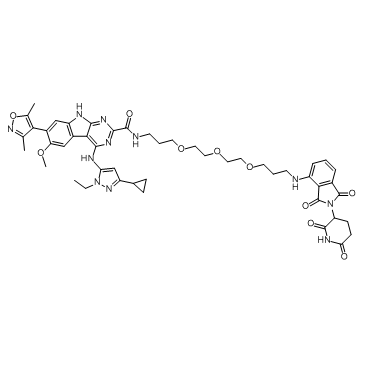| Description |
BETd-246 is a second-generation BET bromodomain (BRD) inhibitor, exhibiting superior selectivity, potency and antitumor activity[1].
|
| Related Catalog |
|
| Target |
BET BRD[1].
|
| In Vitro |
BETd-246 treatment (0-100 nM, 1-3 h) causes a dose-dependent depletion of BRD2, BRD3 and BRD4 in representative TNBC cell lines with 30-100 nM for 1 h or with 10-30 nM for 3 h incubation. BETd-246 (100 nM, 24/48 hours) displays strong growth inhibition and apoptosis induction activity in MDA-MB-468 cell lines. BETd-246 induces a rapid and time-dependent downregulation of MCL1 protein in all the TNBC cell lines evaluated. BETd-246 induces much stronger apoptosis than BETi-211. BETd-246 (100 nM, 24 hours) induces pronounced cell cycle arrest and apoptosis in TNBC cell lines[1]. Cell Proliferation Assay[1] Cell Line: MDA-MB-468 cells Concentration: 100 nM Incubation Time: 24 or 48 hours Result: Displayed strong growth inhibition and apoptosis induction activity in TNBC cell lines. Cell Cycle Analysis[1] Cell Line: Human TNBC cells Concentration: 100 nM Incubation Time: 24 hours Result: Induced pronounced cell cycle arrest and apoptosis in TNBC cell lines. Western Blot Analysis[1] Cell Line: Human TNBC cells Concentration: 0-100 nM Incubation Time: 1-3 hours Result: Caused a dose-dependent depletion of BRD2, BRD3 and BRD4.
|
| In Vivo |
BETd-246 (5 mg/kg, IV, 3 times per week for 3 weeks) treatment effectively inhibits WHIM24 tumor growth, similar to the antitumor activity of BETi-211 with higher dosage and more frequently administration. The treatment of 10 mg/kg induces partial tumor regression during treatment without apparent toxicity. BETd-246 has very limited drug exposure in the xenograft tumor tissue in MDA-M-231and MDA-MB-468 models[1]. Animal Model: “Washington Human in Mouse (WHIM)” (PDX) model developed from a patient with treatment-resistant breast cancer (ESRE380Q, PR- and HER2-))[1]. Dosage: 5, 10 mg/kg Administration: IV, 3 times per week for 3 weeks. Result: Effectively inhibited WHIM24 tumor growth.
|
| References |
[1]. Bai L, et al. Targeted Degradation of BET Proteins in Triple-Negative Breast Cancer. Cancer Res. 2017 May 1;77(9):2476-2487.
|
